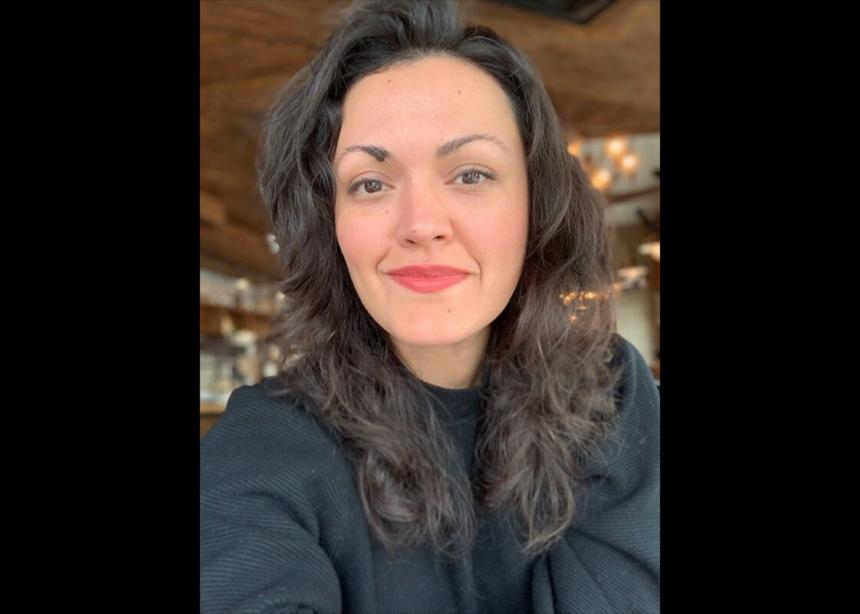Like a garden maze with various starting points, the story of how I became connected to the Mennonite community is the sum of several individual stories that all led to the same place. My family’s journey to the Mennonites began with a Mennonite woman extending her compassion to us, and this has become a recurring theme.
My mother, Maciel Hernandez, and late father, Luis Arias, left Nicaragua in 1987. They crossed the border illegally at Tijuana, Mexico. My mother would give birth to me and my sister in the couple of years that followed. Though my parents never received a reply to their refugee claim, by 1991 our family had lived in California, Texas, Florida and New York, before crossing the border into Canada. I have no recollection of the U.S., but I am told we never once got on a plane to move. My father loved cars and being on the road. He also didn’t mind pushing boundaries.
Once we ended up in Toronto, my mother made it clear to my father that she was done living a nomadic life. She attended night classes and spent her days looking for work, while my father looked after me and my sister. When he wasn’t entertaining us with music, picnics or strolls in the park, he worked odd jobs in construction, helped people move and fixed cars.
Finally, my mom found a volunteer opportunity at the St. Clair O’Connor Community (SCOC), a Mennonite initiative. She began volunteering in the tearoom. Many of the elderly residents grew fond of her and she soon obtained a paid role with the housekeeping department.
But in 1993, Canada Border Services Agency issued an order demanding my mother’s removal from the country. Not knowing what the future would bring for her family, my mother became fearful and would break down and cry at work.
Staff and residents at SCOC became concerned for her. One of them was Nancy Paul, who managed the Ten Thousand Villages shop in the tearoom. Paul introduced my mother to Betty Kennedy Puricelli, a Mennonite pastor. She and her husband, the late Adolfo Puricelli, led New Life Church, a Spanish-speaking congregation where newcomers were invited to explore the Anabaptist faith. The Puricellis also devoted themselves to advocating for immigrants and refugees, and helping them settle.
Though my sister and I were not aware of the pending deportation, on the day of my mother’s scheduled removal from the country, my sister and I were told we could skip school and go to work with our mother. We ended up at Border Services in Niagara Falls with Betty Puricelli, a dozen staff and two dozen seniors from SCOC. They had a message they wanted to deliver face-to-face.
When we arrived, my mother and Puricelli entered the Border Services office. The seniors sat outside on chairs borrowed from neighbouring businesses as they waited.
When the official in charge of my mother’s case stepped out and approached the crowd of seniors, an English gentleman in his 90s by the name of Victor Payne stood up and spoke words engraved in my mother’s heart.
“What do you think you are doing? You want to send her away?”
According to my mother, the official stayed quiet and would not look up. Several other seniors were now standing as Payne continued: “She is like my mother, my sister, my daughter, my granddaughter. Who is going to take care of us if you send her away? What are you going to do about it?”
The official returned to his office. He permitted my mother to return home until they reached a decision. A week later, the residents of SCOC received a letter from the Department of Immigration and Citizenship. The letter informed them that because of their plea, my mother and her family would be granted permanent resident status on humanitarian and compassionate grounds.
The seniors at SCOC felt like the victors and dubbed themselves “The Grey Power.” After a few more years of working with senior residents at SCOC, my mother received an offer to bring her family to live in one of the townhomes of SCOC, which includes intergenerational housing. My sister and I were 7 and 8 when we learned we would each get to have our own bedrooms. Up until then, our family had lived in various half-finished basements throughout Scarborough. Mice and centipedes don’t scare me. I’d long wondered what it would be like to live in the upstairs part of a house where sunlight poured through the windows.
Late one night in March 1997, my mother opened the door to townhouse P12. Weary from weeks of anticipation and packing, we found ourselves enveloped in a stillness that smelled of freshly painted walls and new carpet. We knelt with our hands together and thanked God.
Living at SCOC entrenched our family’s connection to the Mennonite community. By that time we were attending New Life Church regularly. That year, the congregation was welcomed to worship in the upper floor of the Toronto United Mennonite Church (TUMC) building on Queen Street East.
Although I wasn’t a fan of church as a kid, I was never without the possibility of forming connections. Shannon Neufeldt, who currently works with Kairos, served as youth leader at TUMC during my adolescent years. She made consistent efforts to include kids from New Life Church in activities with youth from her congregation.
In 2003, I joined hundreds of young Mennonites from across Canada on a trip to Zimbabwe for the World Mennonite Conference assembly. I remember a gentleman named Andy Brubacher who made sure we always had plenty of food while on the road.
That year, I also joined several youth from TUMC to march alongside thousands in protest of the American invasion of Iraq. My father also joined, along with some members of New Life Church.
My church attendance became less consistent later in my teenage years, but I always crossed paths with Mennonites.
My father shapes a great part of who I am. At age 16 he joined the Sandinista resistance against the ruling dictatorship. He fought until they overthrew President Somoza in 1979.
When I was a child he’d explained to me that the American government funded the dictatorship that ruled Nicaragua for more than four decades. The CIA trained the Nicaraguan guards who tormented their own people.
I could not have been more than 10 years old when I first asked about his involvement in “the war.” I asked whether they had won. I asked who the good guys were.
“No, we didn’t win,” I recall him saying to me in Spanish. He told me that when the “good guys” took power, they became just like the bad guys.
Conflict in Nicaragua carried on through the 1980s in the Contra wars. Looking back now, I believe the aftermath of this revolution left my father profoundly heartbroken and in search of some way to make sense of things.
I’d like to think that in the final two decades of his 54 years, connecting with a community of Christians who challenge the military budgets of wealthy nations, made him feel like he’d always had brothers and sisters out in the world.
We lost my father to cancer on April 13, 2014. In the middle of the night, former TUMC pastor Marilyn Zehr arrived to be with us in the room where my father drew his last breath.
My desire to work as a journalist is born out of the lived experiences of my parents. Through my father I learned that players in a comfortable part of the world—like the CIA—could tug strings and spill the blood of generations in another. My mother’s journey has shown me that bearing witness to the hardships of another can empower someone to take a stand and effect change.
Now, here I am at the service of all those with a story to share no matter who they are.
I am so grateful for the genuine welcome I have received from the people at Canadian Mennonite and for the opportunity to contribute meaningfully to this publication.
Madalene Arias can be reached at ec@canadianmennonite.org.
This article appears in the March 24, 2023 print issue, with the headline “At your service.”



Add new comment
Canadian Mennonite invites comments and encourages constructive discussion about our content. Actual full names (first and last) are required. Comments are moderated and may be edited. They will not appear online until approved and will be posted during business hours. Some comments may be reproduced in print.